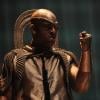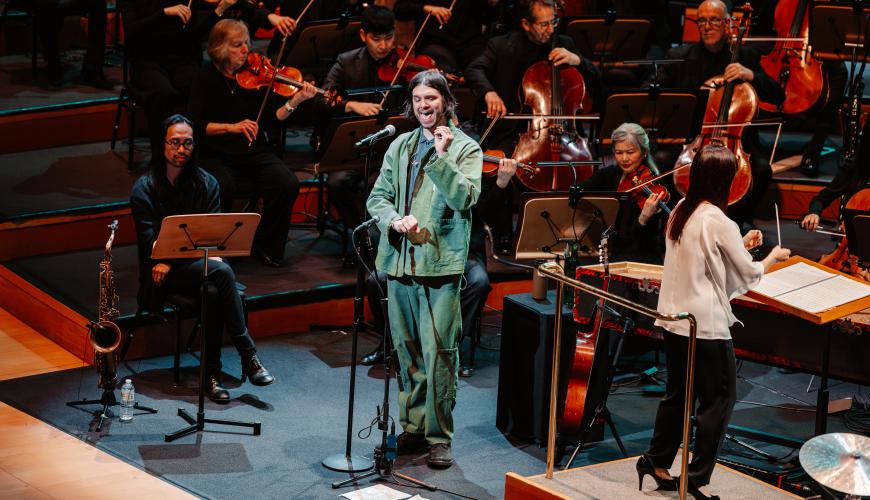
It has been four years since David Longstreth and the current iteration of his band, Dirty Projectors, have performed live. The anticipation was tangible among the beanied and bespectacled crowd that filtered into Walt Disney Concert Hall on March 2, many of whom presumably grew up on Longstreth’s oeuvre. They were clearly curious about what Longstreth has been up to since his most recent turns in the public eye.
The project that’s occupied him, a song cycle with orchestra inspired by Gustav Mahler’s The Song of the Earth, has been in the works longer than his band has been away from the concert stage. On Saturday, Longstreth’s Song of the Earth, first performed by the European orchestral collective stargaze in 2021, had its debut in a revised version, workshopped in conjunction with the Los Angeles Philharmonic. The piece marks the latest in a series of notated works from Longstreth, who’s previously penned compositions for string quartet.
The piece, as strong evidence as any of Longstreth’s eclectic and encyclopedic musical influences, was full of personable, stylistically wide-ranging content and cultured orchestration. Its poignancy, especially in its later movements, gave the performance sufficient airspeed to move past moments of vocal rust or collaborative tentativeness (unlike a pre-intermission set of new work from Mount Eerie, the project of Washington-based musician and “friend of Longstreth” Phil Elverum).
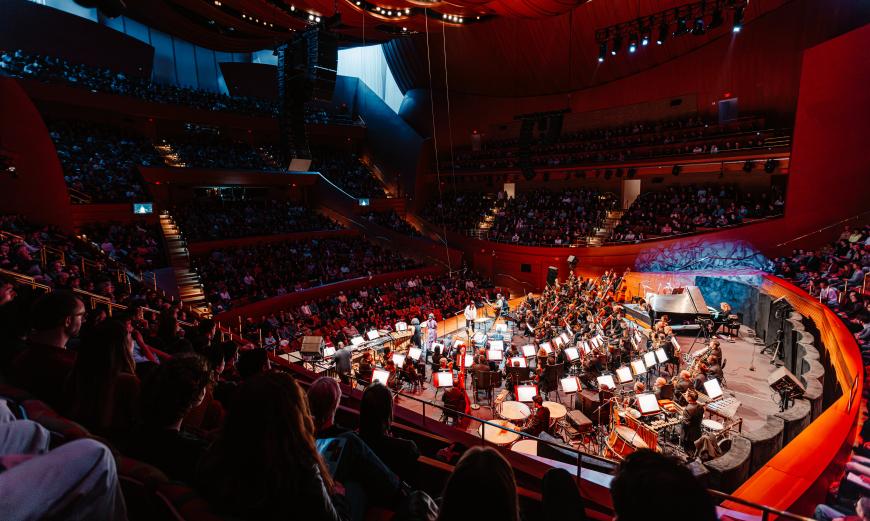
But while Longstreth carried off several moments of invention, some of the evening’s greatest joys were glimpses of the band’s arthouse-indie glory days — pop-edged choral interludes and familiarly stilted grooves in Song of the Earth and a deeply nostalgic encore set of back-catalog classics at the concert’s end.
Elverum’s opening set, a retrospective of songs from his career, was arranged for two electric guitars and two voices. Elverum and his collaborator both showed themselves to be canny manipulators of the guitar. Pawing, tickling, tapping, and other delicate, idiosyncratic articulations created a surprising array of ambient textures that amplified the simple consonant harmonies of Elverum’s songwriting.
His partly spoken vocal style worked in moments of lyrical density but was less satisfying in nimble melodic turns. And his lyrics, at their most potent when operating on a deeply personal level bordering on quotidian, were occasionally interrupted by more grandiose and philosophical musings on colonialism and more.
As Elverum’s set concluded, the songs began to lack textural variety, too. Those with more driven guitar figures needed extra bite and tension, and the stretched, improvisatory sense of pulse began to lose its meditative qualities as it persisted.
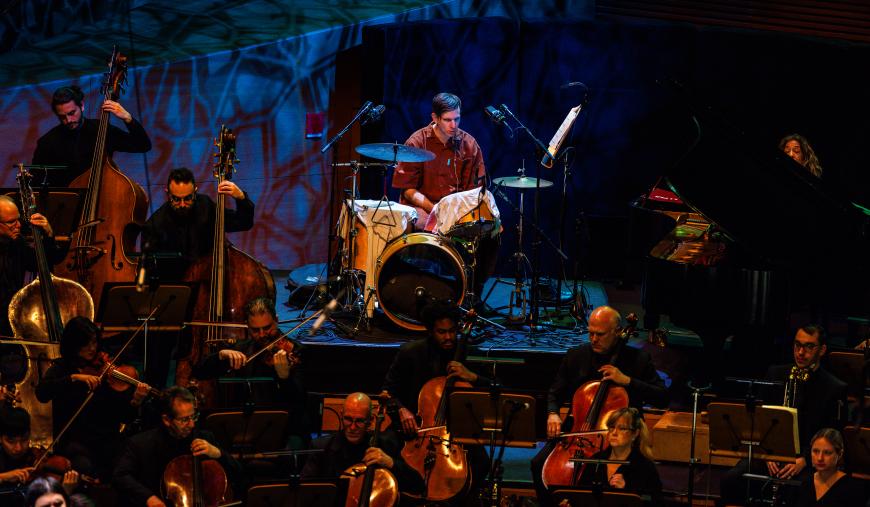
There was little risk of monotony in Longstreth’s opus, arranged for a large orchestral ensemble conducted by Sarah Hicks and featuring multitudinous percussion instruments alongside the band itself. Longstreth was armed with a guitar while bandmate Olga Bell cycled through a harpsichord and an array of synthesizers. The broader palette allowed Longstreth — mixing the personal and the political, like Elverum — to find more drama.
The opening invocation, featuring the strings in a haunting rhythmic unison, recurred powerfully in several tender moments toward the cycle’s end. Meanwhile, percussionist Jodie Landau’s virtuosity, in conjunction with the LA Phil’s timpanist and pianist, lent several almost minimalist selections a brilliant sense of drive while Hicks’s solidity ensured the groove’s coherence.
Longstreth cut a bristling, energetic figure at center stage. It was clear how deeply he and his band have come to feel this music, which they performed from memory, with only a handful of printed notes laid at their feet. His own voice cut a familiar figure atop the instrumentals, its trademark yowls, chewed vowels, and dramatically spun intervallic jumps instantly recognizable.
Though his opening salvos — in low bass and high tenor registers, respectively — were tentative instead of tender, his voice gained steam as he started to explore louder dynamics. It was most striking in movements that paired it with Patrick Shiroishi’s dusky tenor saxophone or against other bandmates’ voices, which so often reinforced Longstreth’s solo lines.
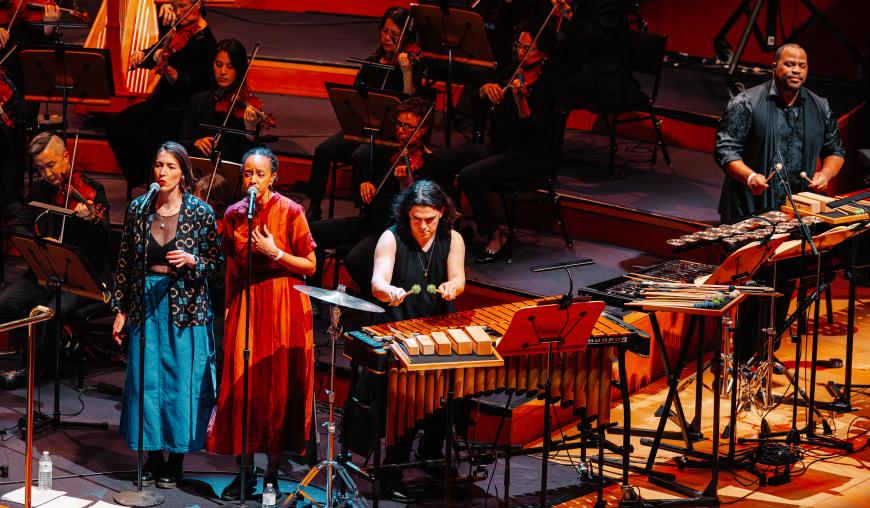
The choral writing also reinforced the lyrical content. Because of the ensemble’s size, lyrics sometimes risked becoming unintelligible or incidental within walls of sound. An echoing refrain of “None of this is true,” in “Uninhabitable Earth, Paragraph 1,” grounded some of the verbose lyrical meditations on climate change in Longstreth’s solo part.
The choral textures were tailored to the other singers’ facility with close harmony and rhythmic phasing. The piece played so directly to the hallmark textures and devices of the band that one wonders whether Longstreth’s cycle functions more as a Dirty Projectors project than as a reproducible classical work that could be taken on by other performers.
But that familiarity is what underpins Longstreth’s new work and was also what Saturday evening’s audience craved. As the band launched into “Overlord” during its closing set of classics, the audience whistled, cheered, and finally felt as warm as it longed to be.



